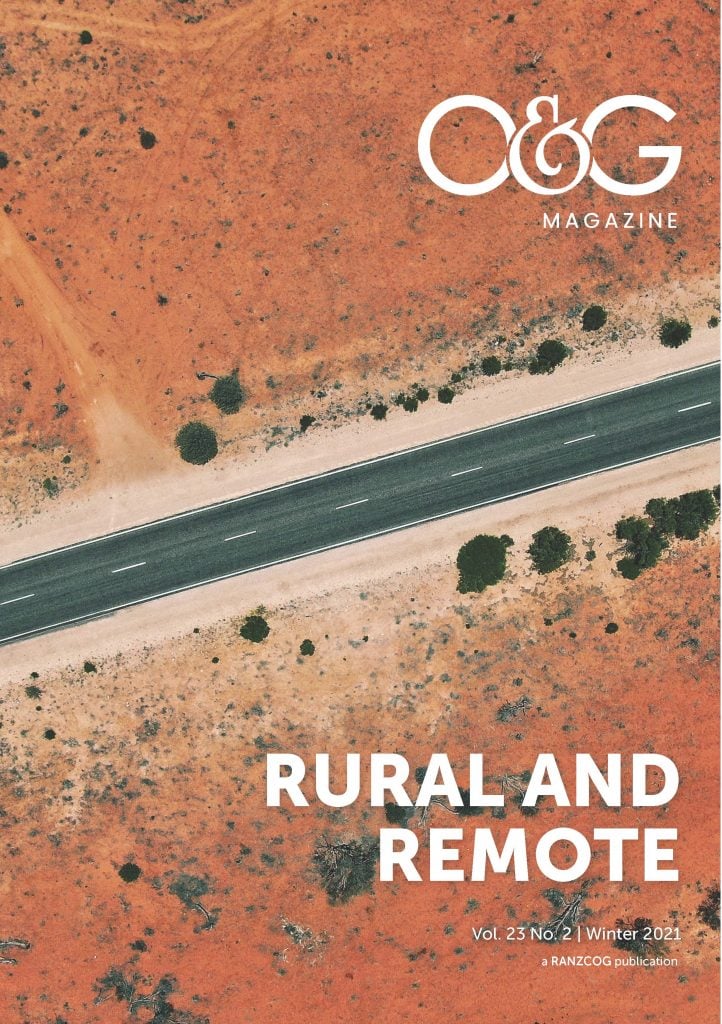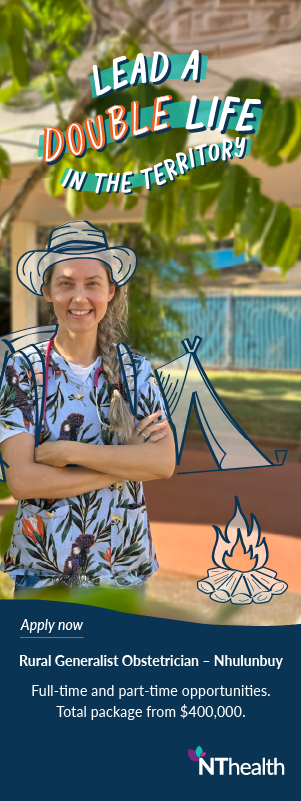On 16 March 2021, at Parliament House, Canberra, RANZCOG joined the Rural Doctors Association of Australia (RDAA) for their annual lunch, throwing a spotlight on the value and importance of maternity care in rural and remote Australia. Dr John Hall, RDAA President, kindly invited me to address the audience comprised of medical leaders, health bureaucrats and senior politicians. A full transcript is included below. It contains many of the messages I want to convey. While the speech was given to an Australian audience, the messages apply to New Zealand, Māori women, and women everywhere.
The central tenet of the message that RANZCOG delivered is that supporting maternity services in rural and remote communities is an opportunity to grow those communities and see them thrive. We began our presentation with a wonderful, commissioned video which beautifully illustrates the centrality of maternity care. While the initial investment in infrastructure and personnel may seem expensive, the return is significant and enduring. Maternity care is a bedrock, a keystone. To provide safe maternity care requires skilled personnel, appropriate facilities and other medical supports. Because you’re caring for pregnant women and their babies you can also provide acute care in so many other areas. The availability of medical care attracts people and services to these regions and the opportunity for growth.
Equity in healthcare is a principle that RANZCOG holds dear. It underpins our training program. Women who live in distant parts of our country are entitled to a high standard of medical care. Closure of local maternity units means that they are dislocated from their families when they have a baby.
The authors in this issue explore the opportunities, challenges and complexities of rural and remote healthcare. Telehealth is one way of bridging the tyranny of distance, a skill that we have all developed during the pandemic. There are the challenges of training the specialist and GP obstetrician to be fit for purpose in a rural setting. Convincing professionals to leave the cities for greener pastures has always been difficult and RANZCOG has established workforce working groups in Australia and New Zealand to explore potential solutions.
At the time of writing, the vaccine against COVID-19 is being rolled out across Australia and New Zealand. Travel is opening up and we’re starting to meet people in person. The RANZCOG CEO, Vase Jovanoska, and I, have taken the opportunity to visit members in Dubbo, Orange, Newcastle, Sydney, Hobart, Launceston and Burnie. The welcome has been warm and generous, and we’ve been able to gain an understanding of the issues facing O&G services in rural locations. Having spent my working life in a metropolitan setting, I am humbled by the aptitude of the doctors and midwives that we’ve met. They deliver quality healthcare with skill and compassion and without the abundant resources we enjoy in the city. I have left each place buoyed by the warmth and culture of my colleagues.
The effects of the pandemic are clearly not over. While we are enjoying a return to a semblance of normality, the rest of the world is imploding. RANZCOG has sent a message of support to our friends in India as we watch in horror the seemingly unstoppable rise in infection and death. Australia and New Zealand are multicultural countries and our thoughts our with the friends and families of our members in the many countries that have not been as fortunate as us. With our midwifery colleagues, we urged the Australian Government to support our neighbours in Papua New Guinea. Periodic outbreaks have meant uncertainty, but we hope that travel between Australia and New Zealand will allow College members to be reunited.
By the time this issue is released, RANZCOG will be relocated to our new home at 1 Bowen Crescent. Visiting College House with all the furniture gone, the books in the library stacked and sorted and the numerous artifacts packed for storage, transfer, or sale, was a melancholy experience. So much of our history is contained at 254 Albert Street. That being said, the new building is fresh, spacious, modern and fit for purpose. I am confident that our members will feel genuinely positive about the new location. It will be a better space for our staff and the facilities will mean that many College activities can be delivered in-house.
On 27 May, during National Reconciliation Week, leaders from all around Australia will gather in Canberra for the RANZCOG Women’s Health Summit. Panels will discuss gender equity, violence against women, mental health and the importance of data. But we won’t just talk. The tagline of the conference is Time to Act, and this summit’s aim is to set the agenda, to identify opportunities and set a course for real and meaningful change. RANZCOG, your College, is best placed to lead that change and lead it we will. A similar Summit is planned for New Zealand later in the year.
Finally, 2021 marks the final year of the Eleventh RANZCOG Council. I am pleased to congratulate Dr Ben Bopp as the President-elect. Elections for the Board and Council will be conducted soon. This is your opportunity. Put your name forward. Have your say. Contribute to your College and the advancement of women’s health in Australia and New Zealand. Be part of something bigger. My own experience of leadership has been challenging and, at times, overwhelming, but ultimately fulfilling. I’ll leave you with the words of American poet Maya Angelou: ‘When you do nothing you feel overwhelmed and powerless. But when you get involved you feel the sense of hope and accomplishment that comes from knowing you are working to make things better.’
Transcript of address to the RDAA Parliament House lunch, Canberra 16 March 2021
Honorable Ministers, ladies and gentlemen.
I would like to begin by acknowledging the Traditional Owners of this land and all lands, waters and communities across Australia. I acknowledge their elders, past, present and emerging. When I say Acknowledgement of Country, I mean it. This is Aboriginal land. Always was. Always will be. What happened 200 years ago is not okay. RANZCOG is a College dedicated to training the next generation of health practitioners who will care for Australian women, wherever they may be. Women are at the centre of all that we do. When we think about the deep trauma and loss of generations of Aboriginal people, past present and emerging, we must make sure that women are central to the narrative. Women who have lost their children. Women who have been physically and sexually abused. Women who are often not represented by panels that discuss women’s issues.
But there is also another loss in this story and that is the loss of opportunity for all of us. By failing to genuinely engage, we deny ourselves the opportunity to learn, to experience, to understand deep and profound truths, history, connection with the land and with each other. We hold conferences on climate change but we don’t consult with the people who managed the environment effectively for 40,000 years.
We hand down a damning report on the Aged Care Sector and we are encouraged to look overseas at the way that they treat their elders. In Australia, we pay respect to elders past, present and emerging. We don’t need to look anywhere else. The answer has been here for 40,000 years. Aboriginal history is our history and our opportunity.
For RANZCOG, women are at the centre of all that we do. Respect for women is our opportunity. The events of the last few weeks, and the last few days, are not political issues. They are cultural issues. The way that our society treats women is a cultural issue. When women feel unsafe, when women feel disrespected, when women do not have an equal place in the home, in the workplace or in leadership positions, the loss is profound for the women themselves.
But it is also a lost opportunity for all of us. We lose the opportunity to benefit from the qualities and contribution of half of our world. We lose the opportunity to live in a harmonious society. We lose the social and economic value that all people can contribute. Inclusion of women, support of women, empowerment of women won’t take away anything from those who already have power. We won’t be worse off if women feel safe, if women aren’t abused, if women aren’t killed. It’s hard to find the negative in a society that actively encourages the full engagement of women. Instead, we will grow, we will develop, we will learn and we will all be happier.
Supporting maternity services in rural and remote communities offers us an opportunity and also ties in with creating a society that values women. There’s an initial investment in infrastructure and personnel. Australia is an enormous country and reaching small communities is difficult and expensive. But the women of the outback are entitled to that care. They have a right to expect the same standard of care as their metropolitan counterparts. They shouldn’t have to be dislocated from their families when they have a baby.
Once again, there is an opportunity. As the video you have just seen so beautifully illustrates, a maternity unit serves pregnant women, but it does so much more. It attracts medical, midwifery and nursing staff and other allied health providers. If you have a facility that can provide acute maternity care, you need the equipment and people who can do that, and those people can do so much more. You can care for acute trauma, heart attacks and strokes, snake bites and asthma. In that moment when you need care, there’s a place where you can go, and it isn’t 500 miles away.
Maternity units attract a very special group of health professionals called GP obstetricians. When I was at medical school, we were told ‘don’t be just a GP’. So I completed specialist training and became a specialist obstetrician and gynaecologist. If you’re pregnant, I have expertise to offer you. But if you’re in a car accident, or have a heart attack, you want someone like John Hall. He can deliver your baby and fix a broken leg. I have come to realise that I am just a specialist.
A maternity service will attract the John Halls of this world. In turn it will attract the people who support him, including specialists. The animator who produced our video lives in rural NSW. Seeking medical care for his family was a nightmare, particularly when his wife was pregnant. They almost moved back. They worried about the lack of medical services. They chose to stay and it’s young people like him that we need in the country. They build communities, support local businesses, attract more people and, before you know it, a town in the country is thriving again.
I’m not a politician and I accept that there are many needs and complexities when it comes to allocation of resources. But what I’m offering you is a gift. Build a maternity unit which gives direct benefit to Australian women. From that maternity unit will grow additional services that will benefit farmers, Indigenous Australians, the people outside our cities who contribute to the soul of this country. Build a maternity unit and they will come. Teachers, bankers, tradespeople, all manner of workers. Turn a remote part of Australia into a place that people want to go, confident that they can receive healthcare for themselves and their family. Watch a town grow. Watch a community grow. Watch a boost to our productivity as a nation.
I hope that I can sell this concept to you simply on the basis that maternity care is a right of Australian women no matter where they live. I hope that caring for women is enough. But if you need more, then our message today is that a maternity unit in rural and remote Australia will reap rich rewards for our country. Start there and the rest will follow.






Leave a Reply